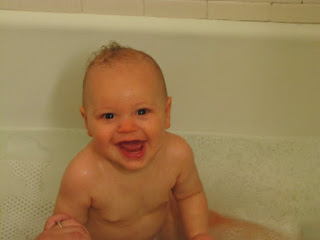So it's been 6 months since our sweet baby boy came into this world. I have been driving myself crazy thinking about how quickly he is growing up. After sifting through other friends' Facebook pages and seeing their babies that were born the same time I was pregnant, seeing how small they were then and how big they are now, there is a bittersweet feeling I get, thinking about our baby Sean being there as well.
I will be posing again sometime in the beginning of August- we are getting family pictures done tomorrow, and Sean's 6 month well check with Dr. Bailey is on August 2nd, so I will be doing an update to include those things.
But for now, here is a little bit about life as it is for us these days.... Mike has been working offshore some, and in the shop some as well. He is waiting for a salary position to open up still, he would really prefer to be at home every night. But for now, since shop-rate doesn't pay the bills, he is still taking offshore jobs when they are available, and working in the shop in between. Sometimes I feel guilty for not working, because I could be bringing in a second income. But then Mike reminds me that me staying at home with Sean is an income in itself, considering we are saving that much on childcare. Plus we both like the idea of him being home with me, and socializing with our friends at this age, rather than being in daycare. As he gets older I plan to enroll him in other social environments like preschool so he can learn to be with groups of children his age. We would only put him in daycare right now in order for me to go back to work.... I have been daydreaming daily about starting my own business of in-home preschool. It's something I will probably not act on anytime soon, but it's a dream I have always had since first going to Montessori training, and I am hoping one day I will have the means to do so.
Sean has been developing faster than I can keep up with! He just recently started to show obvious signs of understanding familiar and unfamiliar people. He used to just smile at anybody, and not even notice much if my face was not in sight when we are out in public places. But lately I have noticed if we are grocery shopping, he needs to know I am close if my face is out of his view, and when new people come over to the house, he takes a minute or two to warm up to them, whereas he quickly lights up when he sees Mike, Katie, Josh, Dan, etc. He is VERY vocal now, trying out all kinds of new noises and sounds. But he seems to be super sensitive to loud noises himself- he almost always cries when someone sneezes or coughs loudly or starts getting too loud when they talk. He can sit up very well on his own now. He just needs to master the concept of "catching" himself when he flops sideways and backwards. I usually put the boppy behind him, or sit behind him, because when he is sick of sitting up he throws himself back to laying down, which can result in bumping his head if he's not on the bed LOL. No signs of crawling yet, but he is VERY mobile in his crib. He will roll back and forth over and over again, and use his feet to push off and move from one end of the crib to the other. He actually sleeps on his belly now- there is no stopping it!! But he is sleeping pretty well and naps and bedtime, and is not shy to "ask" when he needs something, so it works out well. He is also really coordinated with his hands now- he can find his paci in his crib and put it back into his mouth successfully, and easily moves objects from one hand to the other. We started signing a few words to him, hoping in the next few months he will be able to sign back. So far we have started teaching "more," "eat," "milk," "all done," and today I introduced "dog" because he is so enthralled with our dogs : ) I am trying to consistently sign each time I use the word. But it is tricky- words like "more" use two hands. And I usually use that while he is eating. Well, I can't put his bowl on his highchair because he will immediately grab it and flip it over! And when I set it on the table next to me while he eats and use both of my hands to sign, sometimes he is so impatient that extra millisecond it takes me to pick the spoon back up can be frustrating LOL But we just started this about a week ago, so there is a lot of time to work on it. I am hoping that it really benefits us all with communication- It will allow Sean to "talk" to us before he is ready to use words.
That's about all I have right now. I will post anything else I think of in about 2 weeks when I give the updated height and weight stats and post our family photos!

















